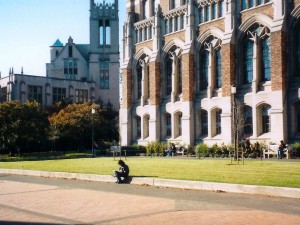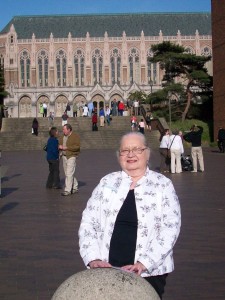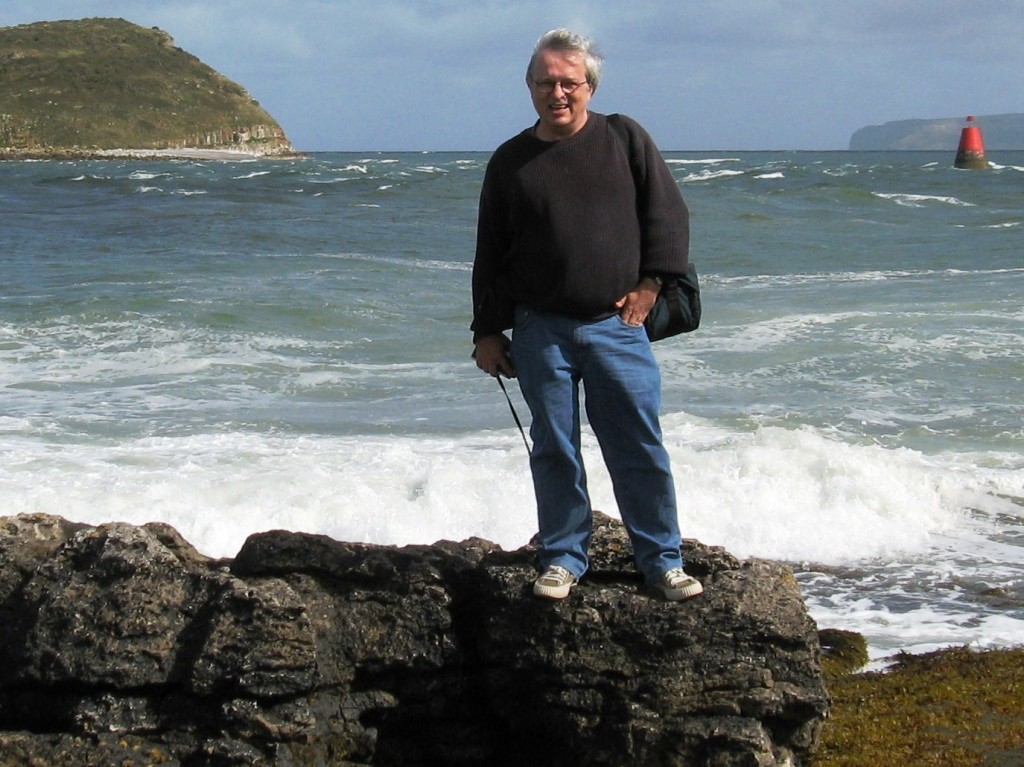» posted on Wednesday, June 13th, 2012 by Linda Lou Burton
Lunch With James
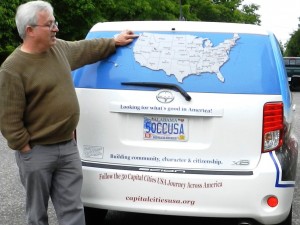 Linda Burton posting from Edmonds, Washington while traveling between Salem, Oregon and Honolulu, Hawaii –“I’ve been interested in politics as long as I can remember,” James recalled. “I used to hand out political flyers for my father when I was five years old.” James and I are sitting in my favorite red-booth spaghetti place in the Wallingford neighborhood, not too far from the University of Washington. I first met James at the University where he taught a class I took several years ago. And now, because James has agreed to serve on the Board of Directors of Capital Cities USA, we’re discussing business. The “historian’s way of looking at things” is the important niche James fills on the Board. You know, that nit-picking three-part method historians insist on using to explain the world – (1) multiple perspectives (2) a variety of sources and (3) critical analysis. It’s much easier to make a surface-level snap judgment about the events of life, and most of us do that, most of the time. But James is a context person. It’s not just what, it’s what led to the what. Go wide, then narrow in. Understand the influences of the time. Look at some of the things James has focused on since developing that interest in politics at his father’s knee; you’ll see what I mean.
Linda Burton posting from Edmonds, Washington while traveling between Salem, Oregon and Honolulu, Hawaii –“I’ve been interested in politics as long as I can remember,” James recalled. “I used to hand out political flyers for my father when I was five years old.” James and I are sitting in my favorite red-booth spaghetti place in the Wallingford neighborhood, not too far from the University of Washington. I first met James at the University where he taught a class I took several years ago. And now, because James has agreed to serve on the Board of Directors of Capital Cities USA, we’re discussing business. The “historian’s way of looking at things” is the important niche James fills on the Board. You know, that nit-picking three-part method historians insist on using to explain the world – (1) multiple perspectives (2) a variety of sources and (3) critical analysis. It’s much easier to make a surface-level snap judgment about the events of life, and most of us do that, most of the time. But James is a context person. It’s not just what, it’s what led to the what. Go wide, then narrow in. Understand the influences of the time. Look at some of the things James has focused on since developing that interest in politics at his father’s knee; you’ll see what I mean.
His MA History Thesis, University of Washington. A Liberty of Fierce Spirits: Taming Popular Sovereignty in the Early American Republic. A study of Fourth of July celebrations in the 1780s and 1790s illustrating how the political struggle between Federalists and Republicans shaped the memory and meaning of the American Revolution. His PhD Dissertation, University of Washington. Restoring the Republic of Virtue—The Presidential Election of 1824. An examination of the institutional and ideological crisis of the 1820s which culminated in the watershed presidential election of 1824.
At the Annual Meeting of the British Association for American Studies held at Cambridge, he was part of the panel Prelude to the Civil Rights Movement: The Struggle to Desegregate the American Bowling Congress, 1945-1951. At the Annual Meeting of the Society for Historians of the Early Republic, he presented The Election of 1824: The Little Magician Reconsidered. Publications include The Anglophone Caribbean Immigrant and Partisan Politics in New York City, 1900-1972 and The Integration of the American Bowling Congress: The Buffalo Experience. Lectures include Rock Music and Social Change in the 1950s and 60s. Seedbed of Jacksonian Democracy: The Election of 1824. The Stamp Act Protests: Defining the Meaning of the American Revolution. His most popular lecture series at the University of Washington, going on now, is an economic history of the United States with an emphasis on the connection between banking crises and their effect on American politics, covering the period from 1790 to 2008.
Classes include The Sixties in America. Sports and Society in the Twentieth Century. American Slavery and American Freedom. US History from 1865. US History to 1865. 19th Century American History. Colonial American History. American Civilization: The First Century of Independence. Besides the focus on history itself, James has taught how to do historical research, and how to write about it critically, which is the point where we met, and why I invited him to be on the Board.
As an always-responsive mentor and an always curious observer of life, I know he can help keep the Capital Cities USA project on a meaningful path. “What do you think is important to tell about a capital city?” I asked. His reply was simple. “Tell a story. What happened there? How did people’s actions in each place impact the development of the United States? Bring the place alive.”
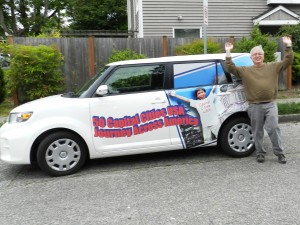 We finished lunch and drained our coffee cups. Outside to show the Scion off; James reviewed the map; just listening to him talk I know how much he loves the USA. “Stand to the side and let me get your picture there, do the pose,” I said. James lifted his arms up in an awkward squared-off shape; I laughed out loud. “It’s not a hold-up James. You taught me history is fun!” “It is,” he replied, laughing too. “And don’t you ever forget.”
We finished lunch and drained our coffee cups. Outside to show the Scion off; James reviewed the map; just listening to him talk I know how much he loves the USA. “Stand to the side and let me get your picture there, do the pose,” I said. James lifted his arms up in an awkward squared-off shape; I laughed out loud. “It’s not a hold-up James. You taught me history is fun!” “It is,” he replied, laughing too. “And don’t you ever forget.”
Such good advice, I thank you James.
The Capital Cities USA bio for Board Member James Rigali, PhD
James Rigali is a native of Seaford, Long Island, and worked in New York city for several years before deciding to head west, settling in Seattle, Washington in 1979. Now a historian and lecturer at the University of Washington, his career began in sports writing. Working for UPI and AP, he covered the Seattle Mariners and the Seattle Sonics for ten years. Then he did a career switch and went back to his first love, which is history.
He earned a BA in history from Colgate University in 1974; in 1990 he enrolled at the University of Washington and earned his Masters degree; followed by his PhD, where his primary field of study was United States 19th Century history. He did archive research in Washington DC and Detroit on African Americans in Sports and African Americans and the Law. He developed the curriculum and taught Sports and Society in the Twentieth Century for the first time in 2005.
His most popular lecture series at the University is an economic history of the United States with an emphasis on the connection between banking crises and their effect on American politics, covering the period from 1790 to 2008. His publications include The Immigrant and Partisan Politics in New York City, 1900-1972, January 2006, Journal of Afro-Americans in New York Life and History.
James still has a fondness for sports, especially baseball, and claims ownership of a large collection of Yankee baseball cards. Second to that is his appreciation for art. His wife is a painter, and together they enjoy the many art venues in Seattle, Portland, New York and Washington DC. Most of his family continue to live in New York and Virginia.

